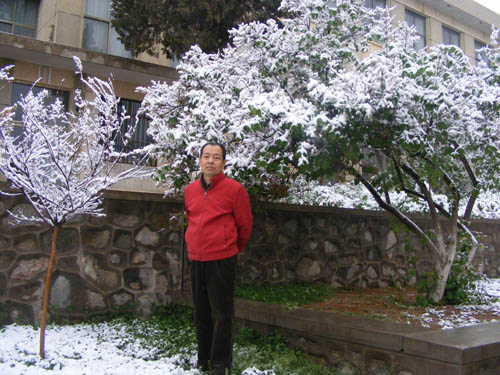
师海忠(Haizhong Shi),男,甘肃临洮人,运筹学与控制论专业理学博士,教授。
高等教育经历
1986年6月于兰州大学数学力学系毕业,获理学学士学位。
1992年6月于兰州大学数学系获理学硕士学位。
1998年6月于中国科学院应用数学研究所获运筹学与控制论专业理学博士学位(导师:堵丁柱教授)。
工作经历
1986年7月至1995年8月在澳门第一娱乐娱城官网数学系任助教、讲师。
1998年7月至2012年8月在澳门第一娱乐娱城官网计算机科学系任副教授、教授。
2012年9月至今在澳门第一娱乐娱城官网任教授。
教学成果
1.给计算机科学系本科生讲授课程:软件工程、操作系统、计算机网络、程序设计(Pascal语言、C语言)、离散数学、概率论与数理统计、线性代数。
2.给数学系本科生讲授高等代数、运筹学、抽象代数。
3.2012年提出并创建了澳门第一娱乐娱城官网计算机科学系本科软件工程专业。
4.指导本科生参加全国大学生数学建模竞赛,获得全国二等奖一项、省级特等奖两项;指导硕士研究生参加全国研究生数学建模竞赛。获得三等奖三项。
代表性科研成果
一 互连网络的模型与结构
1.1设计出超级计算机互连网络的多种模型
a)互连网络的代数环模型
b)互连网络的向量图模型
c)正则图连通圈网络:多种模型的统一体
d)互连网络的新模型:多部群论模型
e)互连网络的层次环群论模型
f)互连网络的k层次环r乘图模型
g)互连网络的细胞分裂生长图模型
1.2设计出的典型互连网络结构(部分)
a)交叉立方体连通圈网络
b)Mobius立方体连通圈网络
c)折叠立方体连通圈网络
d)(n, k) – 多部星网络
e)(n, k) – 多部冒泡排序网络
f)(n, k) – 多部修正冒泡排序网络
二 开创的研究方向
1 (V, R) – 半群
1.1 图半群理论及应用
1.1.1 互连网络半群
1.1.2 复杂网络半群
1.1.3 互联网(Internet)半群
1.2 有向图半群理论及应用
1.3 超图半群理论及应用
1.4 随机图半群理论及应用
1.5 (V,R)-半群理论及应用
2 (V,R)-语言
2.1 无向图语言
2.2 有向图语言
2.3 超图语言
2.4 随机图语言
2.5 (V,R)-语言
3 自然语言的有向图模型
3.1 单词有向图
3.2 句子有向图
3.3 段落有向图
3.4 文章有向图
4 正则图连通圈网络理论及应用
5 环图理论及应用
6 向量图和有向向量图理论及应用
7 细胞分裂生长图理论及应用
三 提出的猜想(部分)
1 关于超级计算机互连网络的猜想
猜想 设G=(V,E)是具有顶点集V={1,2,…,n}(n>2)和m条边的连通图。如果m=2r,则由G生成的Cayley图是边不交的k(0<=k<=r)个Hamilton圈和m-2k个完美对集的并;如果m=2r+1,则由G生成的Cayley图是边不交的k(0<=k<=r)个Hamilton圈和m-2k个完美对集的并。
2 关于(V,R)-半群与(V,R)-语言的猜想
猜想1.1:每个顶点数大于2的图半群都是可重构的。猜想1.2:每个顶点数大于2的无向图语言都是可重构的。 重构猜想:每个顶点数大于2的图都是可重构的。以上三个猜想是相互等价的。
猜想2.1:每个4正则简单图半群都包含3正则子图半群。猜想2.2:每个4正则简单无向图语言都包含3正则无向子图语言。
猜想3.1:若k>2,则不存在每对顶点均由唯一的长为k的路元连接起来的图半群。猜想3.2:若k>2,则不存在每对顶点均由唯一的长为k的路字连接起来的无向图语言。
猜想4.1: 每个连通图半群的边集均为最多(v+1)/2(取整)个边不重路半群的边集的并。
猜想4.2: 每个连通无向图语言的边集均为最多(v+1)/2(取整)个边不重无向路语言的边集的并。
猜想5.1: 每个2边连通的简单图半群的边集均为v-1个圈半群的边集的并集。猜想5.2: 每个2边连通的无向简单图语言的边集均为v-1个无向圈语言的边集的并集。
猜想6.1:若图半群是简单块半群,且至少有v/2+k个度不小于k的顶点,则该图半群有长至少为2k的圈元。猜想6.2:若无向图语言是简单块语言,且至少有v/2+k个度不小于k的顶点,则该无向图语言有长至少为2k的圈字。
问题7.1: 设f(n)是有n个顶点的不含有3正则子图半群的简单图半群的最大可能边数,确定f(n). 问题 7.2: 设f(n)是有n个顶点的不含有3正则无向子图语言的简单无向图语言的最大可能边数,确定f(n).
猜想8.1:|E|>|V|(k-1)/2的简单图半群一定包含具有k条边的所有树半群,其中,|E|和|V|分别表示该图半群的边数和顶点数。猜想8.2:|E|>|V|(k-1)/2的简单无向图语言一定包含具有k条边的所有无向树语言,其中,|E|和|V|分别表示该无向图语言的边数和顶点数。
四 解决的问题(部分)
1 师海忠等证明
(a)自然语言是有向图语言
(b)有向图语言是正则语言
(c)自然语言是正则语言
(d)英语、汉语等自然语言都是正则语言。
2师海忠的论文“互连网络的新模型:多部群论模型”解决了难题:如何提高星网络等互连网络的可扩展性?
3建立了自然语言的有向图模型。
Representtative scientifitic research achievement
1 Models and structures of interconnection networks
1.1Models designed for interconnection networks of supercomputer
a)A ring-theoritic model for interconnection networks
b)A vector graph model for interconnection networks
c)Regular graph connected cycle: A unity model of many interconnection networks
d)New model for interconnection network: Multipartite group-theoretic model
e)A hierarchical ring group-theoretic model for interconnection network
f)A new model for interconnection network: k-hierarchical ring and r-layer graph networks
g)Cell-breeding graph model for interconnection network
1.2Classical structures designed for interconnection nework
a)Crossed cube connected cycle networks
b)Mobius cube connected cycle networks
c)Folded hypercube connected cycle networks
d)(n,k)-multipartite star networks
e)(n,k)-multipartite bubblesort networks
f)(n,k)-multipartite modified bubblesort networks
2Developed research fields
2.1(V,R)-semigroup
2.1.1 Graph semigroup theory with applications
2.1.1.1 Interconnection network semigroup
2.1.1.2 Complex network semigroup
2.1.1.3 Internet semigroup
2.1.2 Digraph semigroup theory with applications
2.1.3 Hypergraph semigroup theory with applications
2.1.4 Random graph semigroup theory with applications
2.1.5 (V,R)-semigoup theory with applications
2.2 (V,R)-language
2.2.1 Undirected graph language
2.2.2 Digraph language
2.2.3 Hypergraph language
2.2.4 Random language
2.2.5 (V,R)-language
2.3 Digraph models for nature languages
2.3.1 Word digraph
2.3.2 Sentence digraph
2.3.3 Passage digraph
2.3.4 Article digraph
2.4 Regular graph connected cycle network theory with applications
2.5 Ring graph theory with applications
2.6 Vector graph and vector digraph theory with applications
2.7 Cell-breeding graph theory with applications
3 Proposed conjectures
3.1 Proposed conjecture for interconnection network
Conjecture Let G=(V,E) be a connected graph with node set {1,2,…,n} (n>2) and m edges. If m=2r, then the Cayley graph generated by G is the union of k (0<=k<=r) edge-disjoint Hamiltonian cycles and m-2k perfected matchings; if m=2r+1, then the Cayley graph generated by G is the union of k (0<=k<=r) edge-disjoint Hamiltonian cycles and m-2k perfected matchings.
3.2 Proposed conjectures for (V,R)-semigoup and (V,R)-language
Conjecture 1.1: every graph-semigroup with v>2 is reconstructible.
Conjecture 1.2: every undirected graph language with v>2 is reconstructible. Conjecture1.1, Conjecture1.2 and Reconstruction conjecture are equivalent.
Conjecture 2.1: Every 4-regular simple graph-semigroup contains a 3-regular subgraph-semigroup.
Conjecture 2.2: Every 4-regular simple undirected graph language contains a 3-regular undirected subgraph language.
Conjecture 3.1: If k>2, then there exists no graph-semigroup with the property that every pair nodes is connected by a unique path element of length k.
Conjecture 3.2: If k>2, then there exists no undirected graph language with the property that every pair nodes is connected by a unique path word of length k.
Conjecture 4.1: The edge set of every connected graph-semigroup is the union of at most (v+1)/2 (integer) edge sets of edge-disjoint path-semigroups.
Conjecture 4.2: The edge set of every undirected connected graph language is the union of at most (v+1)/2 (integer) edge sets of edge-disjoint undirected path languages.
Conjecture 5.1: The edge set of every 2-edge-connected simple graph-semigroup is the union of v-1 edge sets of cycle-semigroups.
Conjecture 5.2: The edge set of every undirected 2-edge-connected simple graph language is the union of v-1 edge sets of undirected cycle languages.
Conjecture 6.1: If graph-semigroup is a simple block semigroup with at least v/2+k vertices of degree at least k, then the graph-semigroup has a cycle element of length at least 2k.
Conjecture 6.2: If undirected graph language is a simple block language with at least v/2+k vertices of degree at least k, then the undirected graph language has a cycle word of length at least 2k.
Problem 7.1: Let f(n) be the maximum possible number of edges in a simple graph-semigroup on n vertices which contains no 3-regular subgraph semigroup. Determine f(n).
Problem 7.2: Let f(n) be the maximum possible number of edges in a simple undirected graph language on n vertices which contains no 3-regular undirected subgraph language. Determine f(n).
Conjecture 8.1: A simple graph-semigroup with |E|>|V|(k-1)/2 must contains every tree semigroup with k edges, where |E| and |V| are number of vertices and number of edges of the graph-semigroup.
Conjecture 8.2: A simple undirected graph language with |E|>|V|(k-1)/2 must contains every undirected tree languages with k edges, where |E| and |V| are number of vertices and number of edges of the undirected graph language.
4 Solved problems
4.1 Haizhong Shi, etc, proved:
a) Any nature language is a digraph language;
b) Any Digraph language is a regular language;
c) Any nature language is a regular language;
d) English, Chinese, etc, are all regular languages
4.2 In paper “A new model for interconnection network: Multipartite group-theoretic model”, Haizhong Shi solved the problem: how to improve the scalability of certain interconnection networks, such as star netwrok, etc.?
4.3 Establish digraph models of Nature languages


